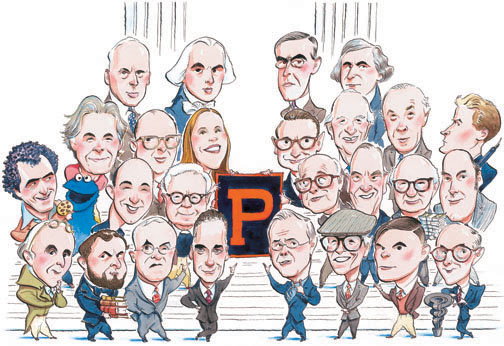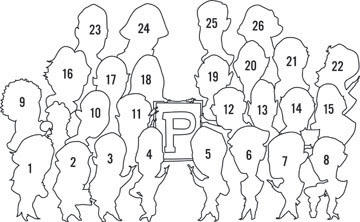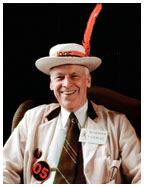Elliott Erwitt/Magnum Photos |
Portraits of influence
#24:
Norman Thomas 1905
A son of Princeton, his life was marked by humor, courage,
and a belief in justice that never died
By Evan Thomas
In the Twenty-Year Record of the Class of 1905, Norman Thomas wrote, “My path has led me away from the road traveled by many old friends. This I regret, but nothing else.” Thomas had agitated against the First World War, helped found the American Civil Liberties Union, and, in 1924, joined the Socialist Party and soon replaced Eugene Debs as the Socialists’ standard-bearer. From 1917 to 1924, Thomas was banned from speaking on the Princeton campus by President John Grier Hibben 1882, an ardent interventionist. But in 1932, when Thomas was the Socialist candidate for president, Hibben had a change of heart, and Princeton gave Thomas an honorary degree. Even that ceremony was unconventional: Though Thomas was sitting on the platform, Dean Augustus Trowbridge forgot to mention him until someone tugged at the dean’s sleeve as he sat down, the degree presentations concluded. Thomas’ degree had become stuck to another honorary degree citation (for Supreme Court Justice Benjamin Cardozo) by a paper clip. “A capitalist paper clip,” Thomas later joked.
Thomas, who was my grandfather, had a sense of humor. He railed against human folly, but he understood it and forgave it. When my father, Evan Thomas ’42, dropped out of Princeton in the fall of 1941 to go to war driving an ambulance with the American Field Service attached to the British Eighth Army, my grandfather wrote him: “If the Lord must be disappointed in us men and our ways, so must be the Devil in the face of such courage, love, and companionship as plain people show.”
Thomas ran for president of the United States six times (1928–1948), but never won more than 800,000 votes. It amused him to recall that Franklin Roosevelt once invited him into the Oval Office and told him, “You know, Norman, I think I’m a better politician than you are.” My grandfather would grin when he told that story and say, “I thought that was a damned obvious thing to say.” Thomas’ 1932 platform — minimum-wage laws, low-cost housing for the poor, a five-day workweek, unemployment insurance, health insurance for the aged, civil rights for blacks, and old-age pensions — doesn’t look so radical now. He was an early and strong anti-communist (Leon Trotsky said, “Norman Thomas called himself a Socialist as the result of a misunderstanding”), and he disapproved of the militancy of radicals in the late 1960s. He disliked seeing young people burning the American flag. “Wash the flag,” he said. “Don’t burn it.”
My grandfather — “Big Dad,” he was called by his family — was in some ways conventionally upper-middle class. In the evenings, he liked to go swimming at the Cold Spring Harbor Beach Club. As a boy, I recall seeing him lying on his back, paddling along as he debated the world’s fate with another beach club member, John Foster Dulles 1908.
Thomas was a brave man. He stood up against petty tyrants. In March 1935, notes William Manchester in The Glory and the Dream, Thomas went to Mississippi to speak out for black sharecroppers and to castigate the racist rule of Gov. Theodore (“The Man”) Bilbo. A drunken mob beat him bloody and threw him across the county line. “We don’t need no goddamn Yankee bastard to tell us what to do with our niggers,” someone said. Three years later, my grandfather spoke out against Mayor Frank (“I Am the Law”) Hague in Jersey City. Police slugged him and escorted him out of town; he came right back. There is a famous Life magazine photo of Thomas, who was an ordained Presbyterian minister, turning his cheek as an egg splatters against his head. A policeman on a horse rears in the background.
Thomas loved Princeton. The son of a Presbyterian minister from Marion, Ohio, he was introduced to the world of ideas at Princeton and graduated first in his class. He faithfully came back to Old Nassau for P-rades. At Reunions, he once dryly remarked, “I prayed to God to make me a sophomore again for just one night. And he did.” Though Thomas wanted to die crusading for justice, and he toured the world into his 80s, the stroke that left him bedridden occurred as he was listening to the 1967 Princeton-Harvard football game; he was stricken when Princeton held on fourth-and-one to preserve an 18–14 upset victory against an undefeated Harvard team.
In Café Vivian at the Frist Campus Center, there is a photo of
Thomas at his 60th reunion in his Class of 1905 beer jacket. When Thomas
returned to Princeton for that reunion, he was half-blind and hobbled
by arthritis. He made his way to the Princeton-Yale baseball game on the
arm of his classmate Ray Fosdick. A cheer from the crowd went up as they
entered the stands. “What’s going on, Ray?” Thomas asked.
“I can’t see. Why are they cheering?” Fosdick turned
to his friend and said, “Why, Norm, don’t you understand?
They’re cheering for you.” ![]()
Evan Thomas, editor-at-large at Newsweek, is in his first year of a five-year campus appointment as the first Ferris Visiting Professor of Journalism in Residence.
Read about others on the list. Click on the illustration below to read about each person. You can also select individuals by name in the index below.

 By
Michael Witte ’66
By
Michael Witte ’66
Who’s who in the illustration: Numbers in parentheses
represent the rankings on the PAW panel’s list.


